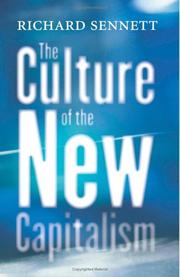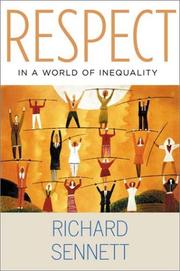| Listing 1 - 10 of 122 | << page >> |
Sort by
|
Book
ISBN: 9789461050984 Year: 2010 Publisher: Amsterdam Boom
Abstract | Keywords | Export | Availability | Bookmark
 Loading...
Loading...Choose an application
- Reference Manager
- EndNote
- RefWorks (Direct export to RefWorks)
Sociology --- sociologie --- humanisme --- 316 --- Sociologie --- Sennett, Richard
Book
ISBN: 9780300116335 0300116330 9786613409058 1283409054 0300178433 9780300188288 9780300178432 9781283409056 Year: 2012 Publisher: New Haven, Conn. Yale University Press
Abstract | Keywords | Export | Availability | Bookmark
 Loading...
Loading...Choose an application
- Reference Manager
- EndNote
- RefWorks (Direct export to RefWorks)
Discusses why people tend to avoid social engagement with those unlike themselves, why increased cooperation is necessary to make society prosper, and the skills necessary for strengthening cooperation.
Political philosophy. Social philosophy --- Sociology of culture --- Cooperation. --- Cooperativeness --- Cooperativeness. --- Social acceptance. --- Social adjustment. --- Moral and ethical aspects. --- Psychological aspects. --- Social aspects. --- 316.45 --- 316.32 --- Cooperation (Ethics) --- Cooperation (Psychology) --- Social psychology --- Adaptation, Social --- Adjustment, Social --- Social adaptation --- Deviant behavior --- Social skills --- Acceptance, Social --- Approval, Social --- Social approval --- Social adjustment --- Social interaction --- Cooperative distribution --- Cooperative movement --- Distribution, Cooperative --- Economics --- Profit-sharing --- Sociale groepen. Groepsprocessen. Kleine groepen. Interactionele groepsdynamiek --- Globale samenlevingsvormen --- 316.32 Globale samenlevingsvormen --- 316.45 Sociale groepen. Groepsprocessen. Kleine groepen. Interactionele groepsdynamiek --- Collaborative economy --- Peer-to-peer economy --- Sharing economy --- Cooperation --- Social acceptance --- Moral and ethical aspects --- Psychological aspects --- Social aspects --- E-books
Book
ISBN: 9780141022109 0141022108 9781846142253 1846142253 Year: 2013 Publisher: London Penguin Books
Abstract | Keywords | Export | Availability | Bookmark
 Loading...
Loading...Choose an application
- Reference Manager
- EndNote
- RefWorks (Direct export to RefWorks)
Discusses why people tend to avoid social engagement with those unlike themselves, why increased cooperation is necessary to make society prosper, and the skills necessary for strengthening cooperation.
Political philosophy. Social philosophy --- Sociology of culture --- 316.45 --- 316.32 --- 316.4 --- 316 --- 3 --- Cooperation. --- Cooperativeness. --- Social acceptance. --- Social adjustment. --- Cooperativeness --- Cooperation (Ethics) --- Cooperation (Psychology) --- Social psychology --- Adaptation, Social --- Adjustment, Social --- Social adaptation --- Deviant behavior --- Social skills --- Acceptance, Social --- Approval, Social --- Social approval --- Social adjustment --- Social interaction --- Cooperative distribution --- Cooperative movement --- Distribution, Cooperative --- Economics --- Profit-sharing --- Sociale groepen. Groepsprocessen. Kleine groepen. Interactionele groepsdynamiek --- Globale samenlevingsvormen --- Sociale processen --- Sociologie --- Maatschappijwetenschappen --- Sociale wetenschappen --- Psychological aspects. --- Social aspects. --- Moral and ethical aspects. --- Groepsdynamica --- Sociale processen. --- Groepsdynamica. --- 316.4 Sociale processen --- 316.32 Globale samenlevingsvormen --- 316.45 Sociale groepen. Groepsprocessen. Kleine groepen. Interactionele groepsdynamiek --- Collaborative economy --- Peer-to-peer economy --- Sharing economy --- Cooperation --- Social acceptance --- Psychological aspects --- Social aspects --- Moral and ethical aspects --- Mode de vie --- Comportement social --- Coopération --- Cooperativeness - Psychological aspects --- Cooperativeness - Social aspects --- Cooperativeness - Moral and ethical aspects
Book
ISBN: 0140216723 9780140216721 Year: 1973 Publisher: Harmondsworth Penguin Books
Abstract | Keywords | Export | Availability | Bookmark
 Loading...
Loading...Choose an application
- Reference Manager
- EndNote
- RefWorks (Direct export to RefWorks)
Environmental planning --- ruimtelijke ordening --- comprehensive plans [reports] --- Sociology of culture --- Cities and towns. --- Community life.
Book
ISBN: 9041702288 Year: 2001 Publisher: Amsterdam Uitgeverij Maarten Muntinga bv
Abstract | Keywords | Export | Availability | Bookmark
 Loading...
Loading...Choose an application
- Reference Manager
- EndNote
- RefWorks (Direct export to RefWorks)

ISBN: 9780300119923 9780300107821 0300119925 030010782X 9786611721879 1281721875 030012872X 9780300128727 9781281721877 6611721878 Year: 2006 Publisher: New Haven Yale university
Abstract | Keywords | Export | Availability | Bookmark
 Loading...
Loading...Choose an application
- Reference Manager
- EndNote
- RefWorks (Direct export to RefWorks)
The distinguished sociologist Richard Sennett surveys major differences between earlier forms of industrial capitalism and the more global, more febrile, ever more mutable version of capitalism that is taking its place. He shows how these changes affect everyday life-how the work ethic is changing; how new beliefs about merit and talent displace old values of craftsmanship and achievement; how what Sennett calls "the specter of uselessness" haunts professionals as well as manual workers; how the boundary between consumption and politics is dissolving.In recent years, reformers of both private and public institutions have preached that flexible, global corporations provide a model of freedom for individuals, unlike the experience of fixed and static bureaucracies Max Weber once called an "iron cage." Sennett argues that, in banishing old ills, the new-economy model has created new social and emotional traumas. Only a certain kind of human being can prosper in unstable, fragmentary institutions: the culture of the new capitalism demands an ideal self oriented to the short term, focused on potential ability rather than accomplishment, willing to discount or abandon past experience. In a concluding section, Sennett examines a more durable form of self hood, and what practical initiatives could counter the pernicious effects of "reform."
Labour market --- Personnel management --- #SBIB:316.334.2A60 --- #SBIB:17H25 --- AA / International- internationaal --- US / United States of America - USA - Verenigde Staten - Etats Unis --- 330.52 --- 338.313 --- Industrial sociology --- Capitalism --- -Industrial organization --- Bureaucracy --- Economic history --- 306.36 --- Economic conditions --- History, Economic --- Economics --- Interorganizational relations --- Political science --- Public administration --- Organizational sociology --- Industries --- Organization --- Industrial concentration --- Industrial management --- Market economy --- Profit --- Capital --- Sociology --- Industrial organization --- Economische sociologie --- Sociale wijsbegeerte: economische orde en arbeid --- Liberaal systeem. Neo-liberalisme. Theorie van de onderhandeling. --- Kapitalisme. --- Social aspects --- Industrial sociology. --- Industrial organization. --- Bureaucracy. --- Economic history. --- Social aspects. --- Liberaal systeem. Neo-liberalisme. Theorie van de onderhandeling --- Kapitalisme --- E-books --- Industrial sociology.. --- Capitalism -- Social aspects.. --- Industrial organization.. --- Bureaucracy..
Book
ISBN: 9789029079211 9029079215 Year: 2007 Publisher: Amsterdam J.M. Meulenhoff
Abstract | Keywords | Export | Availability | Bookmark
 Loading...
Loading...Choose an application
- Reference Manager
- EndNote
- RefWorks (Direct export to RefWorks)
Een leven lang werken bij dezelfde baas is er allang niet meer bij. 'Jong' en 'dynamisch' zijn de sleutelwoorden voor moderne werknemers ' ervaring doet er niet meer toe. Werd er vroeger van je verwacht dat je je settelde, nu ben je ouderwets als je dat doet. Talent en vakmanschap, solidariteit en gemeenschapszin lijken niet meer te tellen. Bedrijven veranderen zelf om de haverklap van identiteit, ze reorganiseren en fuseren. Sennett geeft in De cultuur van het nieuwe kapitalisme niet alleen een haarscherp en genadeloos beeld van hoe de nieuwe economie ingrijpt in ons dagelijks leven, hij pleit ook voor een duurzamere vorm van werken en ondernemen. (Bron : covertekst)
cultuursociologie --- Sociology of work --- economisch denken --- Sociology of culture --- S2007713.JPG --- arbeidssociologie --- #SBIB:316.334.2A60 --- #SBIB:17H25 --- 460.1 Markteconomie, Kapitalisme --- arbeidsmarkt --- competenties --- duurzaam ondernemen --- kapitalisme --- managementvaardigheden --- organisaties, verandering --- sociologie, cultuur --- 331 --- Economische sociologie --- Sociale wijsbegeerte: economische orde en arbeid --- Hulpwetenschappen --- sociologie --- sociologie. --- Sociologie. --- #gsdbF --- Industrial sociology --- Capitalism --- Industrial organization --- Bureaucracy --- Economic History --- Social aspects --- Provincie West-Vlaanderen --- 310 --- politieke economie --- arbeid --- politieke sociologie --- Capitalism - Social aspects
Book
ISBN: 2259023959 9782259023955 Year: 1992 Publisher: Paris : Plon,
Abstract | Keywords | Export | Availability | Bookmark
 Loading...
Loading...Choose an application
- Reference Manager
- EndNote
- RefWorks (Direct export to RefWorks)
Sociology, Urban --- Symbolism in architecture --- City planning --- Cities and towns --- Sociologie urbaine --- Symbolisme en architecture --- Urbanisme --- Villes --- Social aspects --- History --- Aspect social --- Histoire --- Théorie de l'urbanisme --- City and town life --- Public spaces --- Vie urbaine --- Espaces publics --- Design urbain --- City and town life - History --- Vie urbaine - Histoire

ISBN: 0393051269 9780393051261 Year: 2003 Publisher: New York (N.Y.): Norton
Abstract | Keywords | Export | Availability | Bookmark
 Loading...
Loading...Choose an application
- Reference Manager
- EndNote
- RefWorks (Direct export to RefWorks)
Public welfare. --- Welfare recipients --- Respect. --- Aide sociale --- Respect --- Psychology --- Bénéficiaires --- Psychologie --- Public welfare --- -#PBIB:2003.2 --- Public welfare recipients --- Poor --- Deference --- Esteem --- Conduct of life --- Benevolent institutions --- Poor relief --- Public assistance --- Public charities --- Public relief --- Public welfare reform --- Relief (Aid) --- Social welfare --- Welfare (Public assistance) --- Welfare reform --- Human services --- Social service --- Government policy --- Bénéficiaires --- #PBIB:2003.2 --- Welfare recipients - Psychology

ISBN: 9780300119091 Year: 2008 Publisher: New Haven : Yale University Press,
Abstract | Keywords | Export | Availability | Bookmark
 Loading...
Loading...Choose an application
- Reference Manager
- EndNote
- RefWorks (Direct export to RefWorks)
Work --- Motivation (Psychology) --- Travail --- Motivation (Psychologie) --- Moral and ethical aspects --- Aspect moral --- toegepaste kunsten --- Work. --- Moral and ethical aspects. --- 331 --- 17 --- 174 --- Vakmanschap --- #SBIB:316.334.2A70 --- #SBIB:17H25 --- Arbeid --- Ethiek --- Beroepsethiek --- Beroepensociologie: algemeen, middenstand, vrije beroepen --- Sociale wijsbegeerte: economische orde en arbeid --- Industry (Psychology) --- Method of work --- Work, Method of --- Human behavior --- Labor --- Occupations --- Work-life balance --- Action, Psychology of --- Drive (Psychology) --- Psychology of action --- Psychology --- departement Onderzoek 08 --- arts and crafts --- ethiek --- Artisans --- Créativité --- Motivation (psychologie) --- Motivation en éducation --- Personnel --- Motivation --- Aspect psychologique --- Créativité --- Motivation en éducation
| Listing 1 - 10 of 122 | << page >> |
Sort by
|

 Search
Search Feedback
Feedback About UniCat
About UniCat  Help
Help News
News